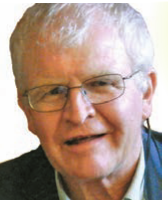How we see others is a reflection of ourselves
A recent Associated Press–National Opinion Research Center poll found that 62% of adults say U.S. democracy could be at risk depending on who wins the 2024 presidential election — 72% of Democrats and 55% Republicans agree, but for very different reasons. Democrats worry that we could elect an authoritarian president, while Republicans are concerned that government overreach and mandates are a threat to fundamental freedoms.
I recall conversations with someone I have known for a long time who posts negative comments on social media about politicians and their supporters on the Republican side. While Facebook is great for staying socially connected, I avoid politics on social media, but we have had offline conversations and emails that included references to people on the right as evil, idiots, insane, dumb, bigots, dangerous, uneducated, ignorant, vile and fake patriots.
I pushed back, arguing that, when people are told they are stupid or unworthy, it alienates them further, generating more negativity towards your side and exacerbating the problem. If you are convinced you are “right,” how is it OK to attack those who are “wrong,” but expect those who are “wrong” to say no such things to your side? How does that win them over to your perspective? People vote the way they do for any number of reasons, and every person is an individual with their own needs and aspirations. It is unfair to make assumptions.
In this climate of mutual contempt, the only solution seems to be vanquishing the other side. I recall the Cold War term “mutually assured destruction.”
This is not so much about compromise — vigorous policy difference and debates are vital to vibrant democratic governance — but rather about how we treat people who disagree with us. When we start from a position that “those people” are evil or stupid, it is hard to see a way forward.
As an active volunteer with the national organization Braver Angels, I know from our many free workshops that, when people from different sides have conversations and really listen to each other, they find much more in common than previously believed. The hard part is when they go back to their bubbles where the voices of conflict entrepreneurs are so prevalent, fed by media and social media algorithms. Conflict entrepreneurs, as described by author Amanda Ripley, are “people who inflame conflict for their own ends. Sometimes they do this for profit, but more often for attention or power.”
If we cannot find a way to get past identity politics, I fear for the future of our great nation. Are we headed to another Civil War? How do we break this vicious cycle?
This is tough work, but change can happen, beginning with understanding that how we see others is a reflection of ourselves. Stepping out of our silos, as author Monica Guzman observes, “can take patience, humility, and a good heap of courage.” Changing the country has to start with changing yourself. When enough of us act and demand better, politicians will follow, too. I know that I can do better, how about you?
I am not a fan of horoscopes, but recently noticed this one: “You can move mountains with the power of your words. Use them wisely.” A recent column elicited many positive responses including: “Your ‘Living with Optimism Amid Our Nation’s Challenges’ article was great. You should be on 60 Minutes to talk about the things you wrote about. I have been saying for several decades that we need thought leaders who can convey a vision of a better future. You are one.’” I don’t usually make New Year’s resolutions, but plan to take that advice to heart and look for new ways to address the stark problems of division and polarization facing our nation. I want to explore deeper how to touch hearts and give people hope in the spirit of Krista Tippet: “Hope is not about optimism, it is about seeing what is dysfunctional and insisting that the world doesn’t have to be that way.”
I have a tentative book title — “Beyond the Politics of Contempt: Leading Yourself (and Others, too!) to Make our Country Better.” Of course, I welcome your thoughts and partnership in this journey.
We each have an extraordinary opportunity to make a difference in people’s lives, including our own. Don’t underestimate your impact!
Douglass P. Teschner, founder of Growing Leadership LLC, can be reached at dteschner@GrowingLeadershipLLC.com.